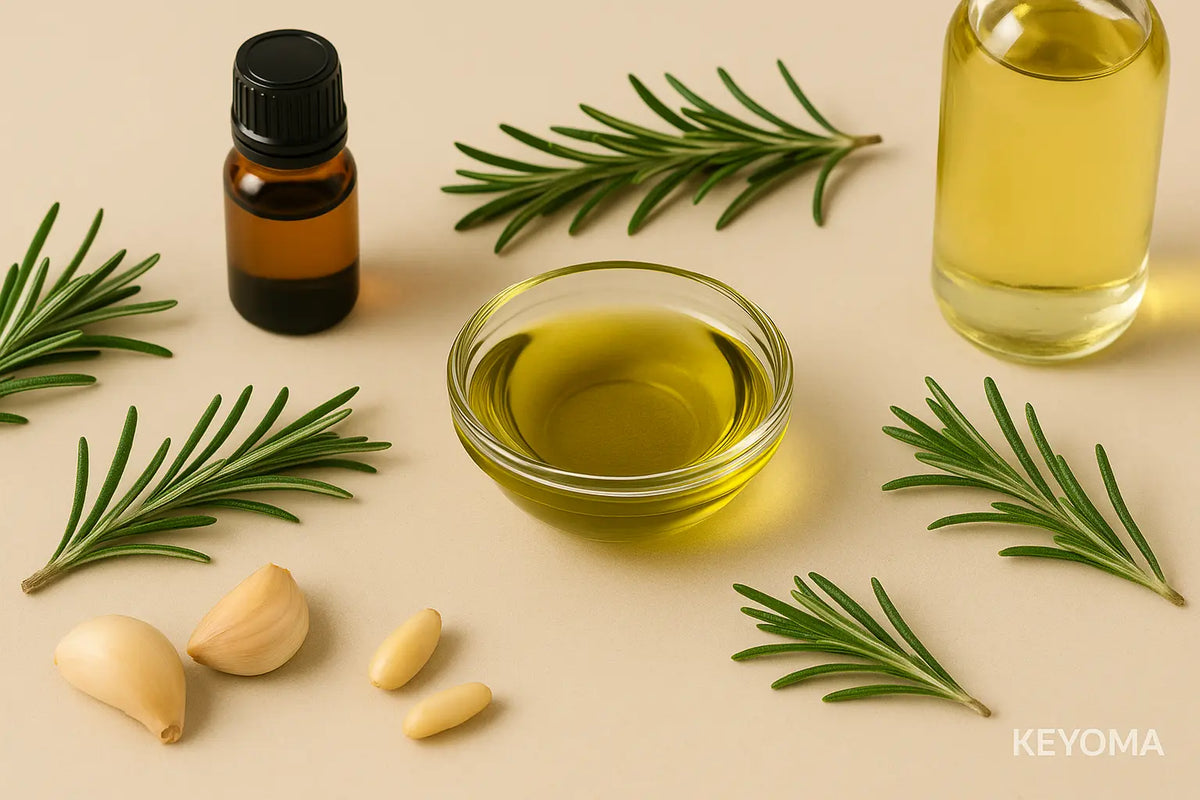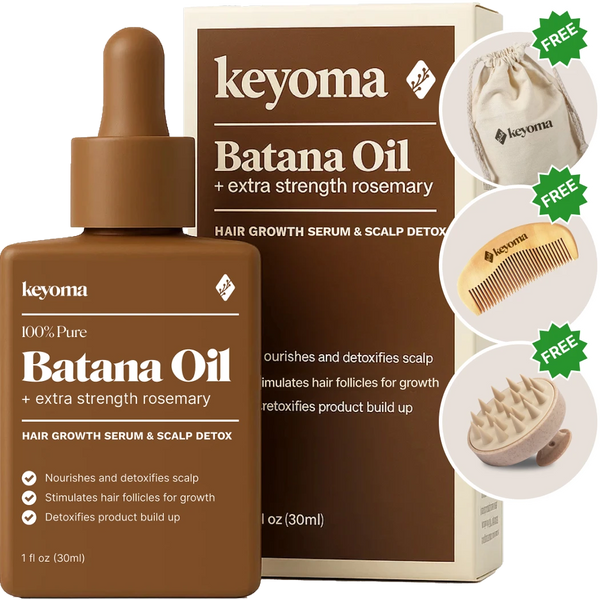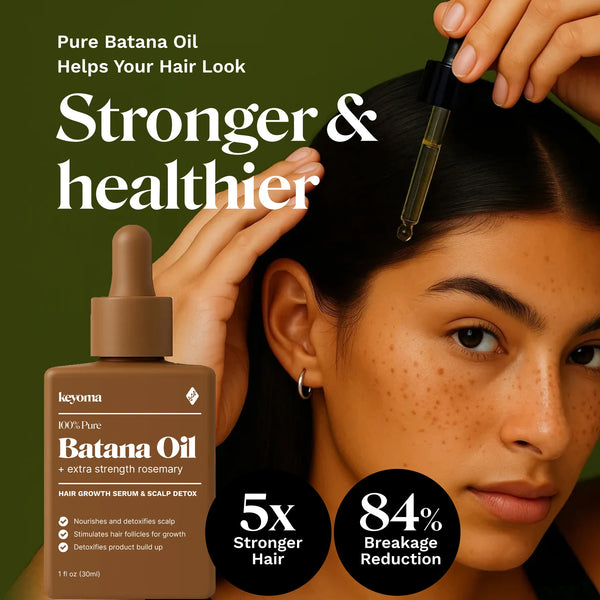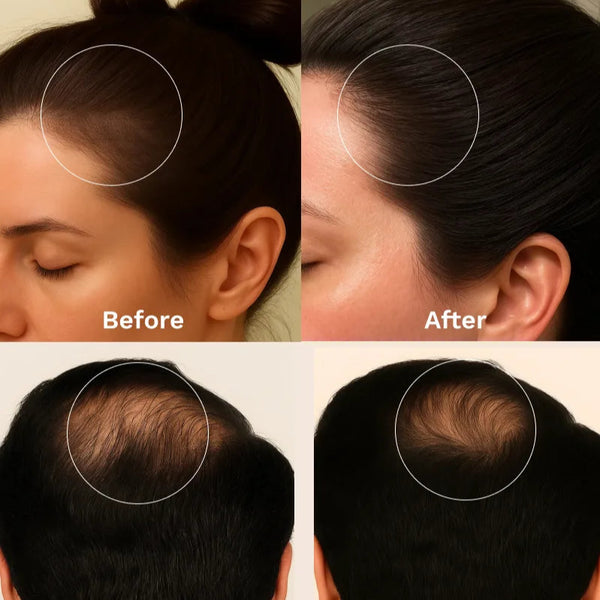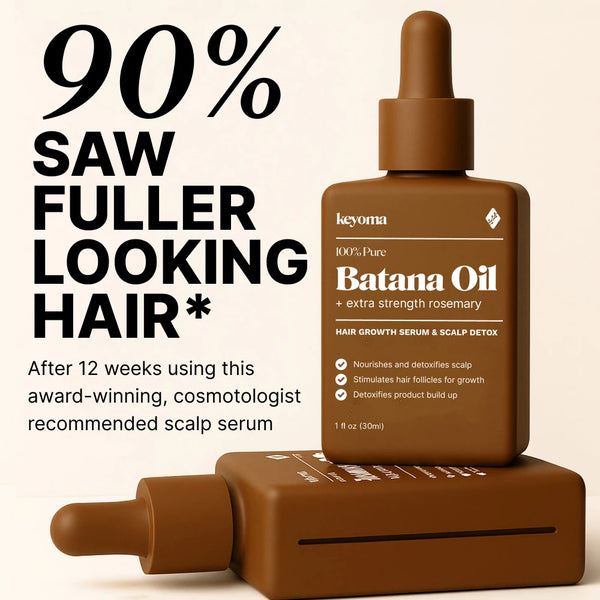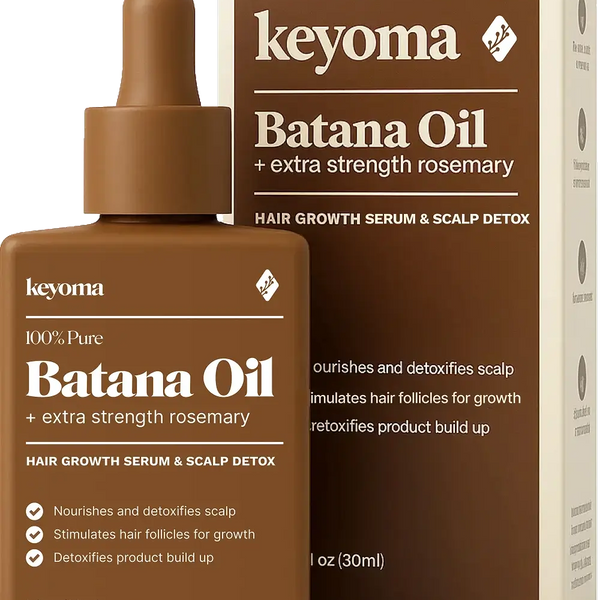In this article
Rosemary oil is one of the most popular and well-studied essential oils for hair growth. In fact, some studies have even found its results comparable to 2% minoxidil, the gold standard many dermatologists recommend for regrowth.
Still, rosemary is an essential oil, and essential oils aren’t the type of thing you just slap straight on your scalp. They’re potent, highly concentrated, and when misused can leave you with more irritation than benefits. That’s why dilution is a must.
In this guide, we’ll walk through the safe dilution ratios, the best carrier oils to pair rosemary with, step-by-step mixing instructions, and practical tips so you can use it safely and confidently—and actually see results.
How Do You Dilute Rosemary Oil for Your Hair? Safe Ratios
Safe Ratios for Hair Application
Proper dilution of rosemary oil for scalp use is generally around 1–2% for adults. That translates to about 3–6 drops of rosemary oil per tablespoon (15 mL) of carrier oil.
To put that into perspective, if you’re filling a small 30 mL travel bottle (a common size for hair oils), you’d need about 6–12 drops of rosemary oil. For a larger 100 mL batch, you’d use roughly 20–40 drops.
When it comes to diluting essential oils for sensitive scalps, start lower at about 0.5% concentration, roughly 1 to 2 drops per tablespoon of carrier oil. If your skin tolerates it well, you can slowly adjust to a slightly higher strength over time.
Steps for Diluting Rosemary Oil in a Carrier Oil
Before you start, set out a small glass dropper bottle or a clean ceramic bowl, a teaspoon or tablespoon for measuring carrier oil, and a glass dropper or pipette for the rosemary oil. Make sure all utensils are dry to avoid contamination.
For this example, let’s assume you’re mixing up just enough for immediate use—about one tablespoon (15 mL) of carrier oil in a small bowl or dropper bottle. Here’s how to dilute rosemary oil in three easy steps:
-
Measure your carrier oil. Pour one tablespoon (15 mL) of coconut or jojoba oil into the bowl or bottle using a clean spoon.
-
Count your drops. With a glass dropper or pipette, add 3–6 drops of rosemary oil to reach a 1–2% dilution.
-
Mix thoroughly. Stir with a spoon if you’re using a bowl. If you’re mixing directly in a bottle, cap it and shake gently. The blend combines instantly, so you can use it right away.
If you want to prepare a bigger batch for regular use, follow the same method but scale up your measurements. For example, if you’re making a 30 mL hair oil blend, simply double the amounts listed above.
The key is to keep the same 1–2% ratio, counting drops of rosemary oil relative to the volume of carrier oil you pour. This way, no matter the container size, you’ll always stay within the safe dilution range
What Can I Mix Rosemary Oil With For My Hair? Best Carrier Oils
Carrier oils are the safest and most effective base for diluting rosemary essential oil. They not only disperse concentrated rosemary evenly but also bring their own nourishing benefits to your scalp and strands.
In other words, they let you stack the benefits of different oils—similar to what you get when making DIY hair oil recipes.
Below are the best carrier oils for rosemary dilution, along with what makes each one worth reaching for.
Coconut Oil
Mixing rosemary with coconut oil is one of the most common pairings in hair care. Coconut oil is rich in lauric acid, a fatty acid small enough to penetrate deep into the hair shaft, where it helps reduce protein loss.
This makes it especially useful if your hair feels weak from chemical treatments or frequent washing.
Keep in mind that coconut oil solidifies at cooler temperatures. Warm it slightly between your palms or place the bottle in warm water before mixing and applying for smoother spreading.
Batana Oil
Batana oil is a rich, buttery carrier oil packed with oleic acid, palmitic acid, and vitamin E. More than being nutrient-dense, it’s also a tradition passed down for generations by the Miskito people of Honduras—celebrated as the “People of Beautiful Hair.”
It’s no wonder then that batana has become a craze on social media, with so many people chasing after the same healthy, full-bodied hair the Miskito are known for.
Batana works beautifully on its own as a nourishing oil, but pairing it with rosemary makes perfect sense, since rosemary supports scalp circulation.
Jojoba Oil
Jojoba oil is technically a liquid wax that closely mimics human sebum. This structural similarity allows it to signal the scalp to slow down excess oil production, which is why it works so well for balancing oily or acne-prone scalps.
Because it absorbs quickly without leaving a greasy film, jojoba is excellent for leave-in blends. It delivers lightweight hydration, softens strands, and makes a great base if you want an oil that conditions without weighing hair down.
Argan Oil
Argan oil is often called “liquid gold” because it’s loaded with vitamin E and essential fatty acids. These compounds act as antioxidants that fight free-radical damage on the scalp, while the fatty acids coat and seal the cuticle to reduce breakage.
Another plus is that argan oil is lighter than coconut or batana, so it doesn’t leave as greasy a feel. That makes it a great choice if you want to use a rosemary oil blend during the day without your hair looking weighed down.
Grapeseed Oil
Another popular, lightweight, and non-greasy alternative is grapeseed oil, which works especially well for fine or thin hair types. It’s rich in linoleic acid, which helps strengthen the scalp barrier and control inflammation.
One thing to keep in mind is that grapeseed oil oxidizes faster than heavier oils, so store your blend in a dark glass bottle and use it within a couple of months for the best freshness.
What Happens if You Apply Rosemary Oil Without Diluting?
Applying rosemary essential oil directly to your scalp without dilution can cause irritation, redness, and even a burning or itching sensation.
Because the oil is so concentrated, some people may also notice increased shedding right after use—hence the all-too-common question, “Why is my hair falling out after using rosemary oil?”
Dilution matters because it spreads the active compounds across a larger base, lowering their intensity on the skin. A safe carrier oil like batana, jojoba, or coconut, acts as a buffer, allowing the rosemary to penetrate gradually while also moisturizing and protecting your scalp.
What is the Best Way to Apply Rosemary Oil to Hair?
The best way to apply rosemary oil to your hair is to massage a diluted blend directly into your scalp. Use your fingertips to gently work the oil in, focusing on areas where you want to encourage growth, such as the crown or part line.
How Long to Leave It In
Leave the diluted rosemary oil on your scalp for at least 30 minutes before rinsing. But if you want deeper conditioning, you can keep it overnight by wrapping their hair in a towel or using a protective cap, then washing it out the next morning.
How Often to Apply
You can apply the rosemary hair oil blend 2–3 times per week. Daily use is also fine, as long as your scalp tolerates it and your hair doesn’t start feeling greasy or weighed down.
Safety Tips for Applying Rosemary Oil Blend
Before you start using rosemary oil blends regularly, always keep these safety reminders in mind to protect your scalp and help you get the most from your mix:
-
Do a patch test: Apply a small amount to your inner arm or behind your ear and wait 24 hours to check for any redness, itching, or irritation.
-
Never use undiluted: Rosemary oil is highly concentrated. Always dilute it at a safe 1–2% ratio before applying to your scalp.
-
Store correctly: Keep your blend in a dark glass bottle and place it in a cool, dry spot. Direct sunlight or heat can speed up oxidation and reduce the oil’s effectiveness.
-
Consider health conditions: Pregnant or breastfeeding women, children, and people with epilepsy or high blood pressure should speak with a healthcare professional before use.
Can I Dilute Rosemary Oil With Water for Hair?
No, you can't dilute rosemary oil with just water. Water and oil are immiscible. They don't truly mix.
If you try to add rosemary essential oil directly into water, the droplets will float on the surface rather than dispersing. That means when you apply it to your scalp, you’ll still be getting undiluted oil in spots, which can irritate your skin.
For that reason, the best practice is to dilute rosemary oil with a coconut, jojoba, batana, or other carrier oils. These not only disperse the oil evenly but also add nourishing benefits to your scalp and strands.
Frequently Asked Questions (FAQs)
What is the ratio of rosemary oil to carrier oil?
Use about 1–2% dilution, which equals 3–6 drops of rosemary oil per tablespoon (15 mL) of carrier oil. For larger bottles, you can increase the amounts, as long as you keep the same ratio. For example, a 100 mL carrier oil base would require about 20–40 drops of rosemary oil.
Is too much rosemary oil bad for hair?
A rosemary oil blend can cause problems if used too heavily. Too much may clog pores on the scalp, leaving your hair greasy and your roots weighed down. It’s best to start with small amounts and only increase once you know how much your hair actually needs.
Using undiluted rosemary oil, on the other hand, is always a bad idea. Essential oils like rosemary are highly concentrated and potent, and direct contact with the skin carries a high risk of irritation, dryness, and even temporary shedding.
Who should not use rosemary oil?
Pregnant or breastfeeding women, young children, and people with epilepsy or high blood pressure should avoid rosemary oil unless cleared by a healthcare professional. This is because the active compounds can interfere with sensitive health conditions.
Can rosemary oil regrow hair?
Yes, studies have shown that rosemary oil can support regrowth, especially in cases of thinning around the crown or part line. In fact, its effects have been found to be comparable to minoxidil. That’s why Keyoma’s batana and rosemary formulation is based on this powerful pairing.
Can I mix rosemary oil into shampoo or conditioner?
Yes, you can add a few drops of rosemary oil into your shampoo or conditioner. This method is convenient, but the dilution will be weaker compared to mixing with carrier oils. If you want stronger, targeted results, preparing a carrier oil blend is the more effective approach.
Don't Want to Dilute Oils Yourself? Try This Easy, Pre-Formulated Rosemary Blend!

If the thought of spilling oil on the table, miscounting drops, or ending up with a greasy batch you can’t fix is too much of a hassle, you can skip all that! Keyoma’s Batana & Rosemary Oil blend is already prepared at a safe ratio, bringing together rosemary’s scalp-stimulating power with batana’s long, passed-down tradition of nourishing hair—all in one bottle.
It's the perfect ready-to-use option you can quickly grab off the shelf (or pull from your bag) and massage into your scalp to get thicker, healthier hair—and a more confident you!
Try Keyoma’s Batana & Rosemary Oil today. And if you’d like more natural hair care tips, head over to the Keyoma blog.
Featured Product
100% Pure Batana Oil + Rosemary
↓Best Batana Oil to Buy↓
1 Month
Subscribe & Save
- 30-day supply delivered monthly $35
- 30% off for life $6
- Free haircare essentials kit $33
- Free custom wooden comb $10
- Free scalp massager $15
- Free eco-friendly travel bag $8
- 30-Day Money Back Guarantee
- Free Shipping
- Online portal for easy cancel, skip, or pause.
1 Month One Time Purchase
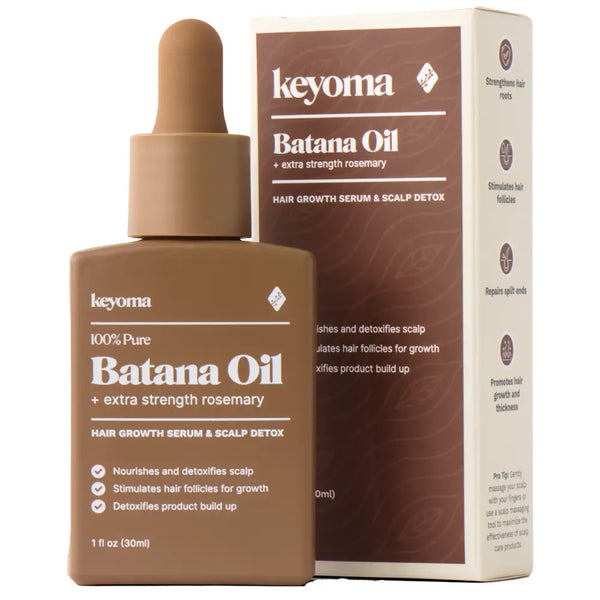
- 30-day supply $50
- 30% off for life $6
- Free haircare essentials kit $33
- Free custom wooden comb $10
- Free scalp massager $15
- Free eco-friendly travel bag $8

